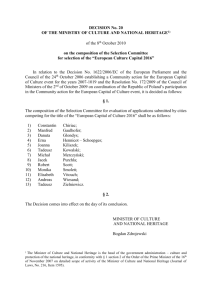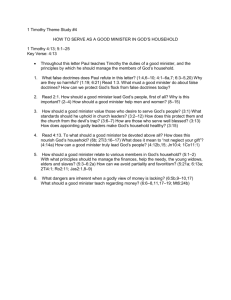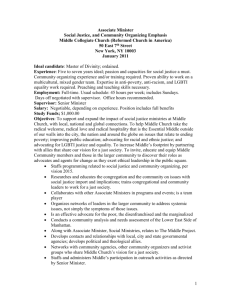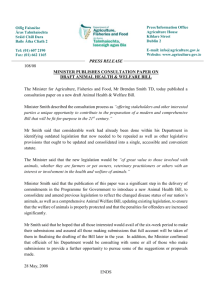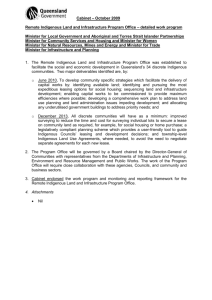THE BAPTIST UNION OF GREAT BRITAIN
advertisement
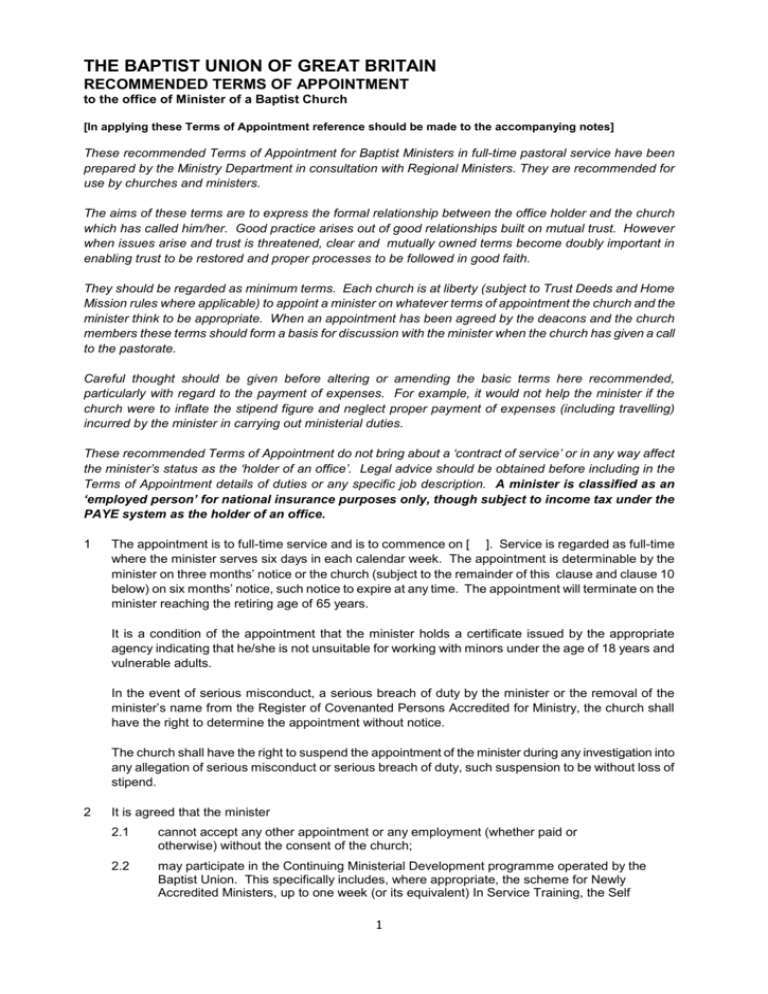
THE BAPTIST UNION OF GREAT BRITAIN RECOMMENDED TERMS OF APPOINTMENT to the office of Minister of a Baptist Church [In applying these Terms of Appointment reference should be made to the accompanying notes] These recommended Terms of Appointment for Baptist Ministers in full-time pastoral service have been prepared by the Ministry Department in consultation with Regional Ministers. They are recommended for use by churches and ministers. The aims of these terms are to express the formal relationship between the office holder and the church which has called him/her. Good practice arises out of good relationships built on mutual trust. However when issues arise and trust is threatened, clear and mutually owned terms become doubly important in enabling trust to be restored and proper processes to be followed in good faith. They should be regarded as minimum terms. Each church is at liberty (subject to Trust Deeds and Home Mission rules where applicable) to appoint a minister on whatever terms of appointment the church and the minister think to be appropriate. When an appointment has been agreed by the deacons and the church members these terms should form a basis for discussion with the minister when the church has given a call to the pastorate. Careful thought should be given before altering or amending the basic terms here recommended, particularly with regard to the payment of expenses. For example, it would not help the minister if the church were to inflate the stipend figure and neglect proper payment of expenses (including travelling) incurred by the minister in carrying out ministerial duties. These recommended Terms of Appointment do not bring about a ‘contract of service’ or in any way affect the minister’s status as the ‘holder of an office’. Legal advice should be obtained before including in the Terms of Appointment details of duties or any specific job description. A minister is classified as an ‘employed person’ for national insurance purposes only, though subject to income tax under the PAYE system as the holder of an office. 1 The appointment is to full-time service and is to commence on [ ]. Service is regarded as full-time where the minister serves six days in each calendar week. The appointment is determinable by the minister on three months’ notice or the church (subject to the remainder of this clause and clause 10 below) on six months’ notice, such notice to expire at any time. The appointment will terminate on the minister reaching the retiring age of 65 years. It is a condition of the appointment that the minister holds a certificate issued by the appropriate agency indicating that he/she is not unsuitable for working with minors under the age of 18 years and vulnerable adults. In the event of serious misconduct, a serious breach of duty by the minister or the removal of the minister’s name from the Register of Covenanted Persons Accredited for Ministry, the church shall have the right to determine the appointment without notice. The church shall have the right to suspend the appointment of the minister during any investigation into any allegation of serious misconduct or serious breach of duty, such suspension to be without loss of stipend. 2 It is agreed that the minister 2.1 cannot accept any other appointment or any employment (whether paid or otherwise) without the consent of the church; 2.2 may participate in the Continuing Ministerial Development programme operated by the Baptist Union. This specifically includes, where appropriate, the scheme for Newly Accredited Ministers, up to one week (or its equivalent) In Service Training, the Self 1 Appraisal Scheme and the Sabbatical Scheme. Involvement in these schemes shall be without loss of stipend. 3 The church shall pay to the minister a stipend of £19,350 pa to be paid by equal monthly instalments on the [16th] day of each month 4 For the better performance of his/her duties the church will provide a manse for the use and occupation of the minister and his/her immediate family during the continuance of the appointment and in this respect the minister shall keep the interior of the manse and its garden in a clean and tidy condition and the church shall be responsible for: 4.1 the repair and maintenance of the exterior of the manse; 4.2 the redecoration of the interior of the manse prior to the minister taking up appointment; and 4.3 the payment of council tax, water and sewage charges and building insurance premiums 5 The minister shall be entitled to twenty five days annual holiday in each full calendar year (to be taken by arrangement with the deacons) and, subject to prior arrangement with the deacons, shall also be entitled to be absent from the pulpit on nine Sundays during each full calendar year without incurring any responsibility for finding or paying any replacement preacher. Public holidays are extra to the twenty five days. The church agrees that up to 5 days holiday may be carried forward to the following year. 6 The church shall provide a telephone at the manse and will be responsible for payment of the whole cost of the rental and all church business calls. The minister shall reimburse the church with the cost of all personal calls in respect of which a reasonable record shall be kept. 7 The church shall pay to the minister in respect of all approved church business travel a mileage allowance in accordance with the ‘undifferentiated’ rates laid down from time to time by the Inland Revenue under the ‘Fixed Profit Car Scheme’. The minister shall be responsible for keeping a record of all such business mileage which shall be provided to the church treasurer. 8 The church shall reimburse the minister for the cost of any other approved travelling and out of pocket expenses incurred on church business, including postage, stationery and attendances at Baptist Union and Association Assemblies and the Area Ministers’ Annual Conference. 9 The church shall pay its share of the contributions due in respect of the minister’s membership of the Baptist Ministers’ Pension Fund insofar as they relate to this appointment. 10 The stipend shall be paid in full during any temporary incapacity of the minister due to illness. Where such incapacity shall persist for more than six consecutive months, or a total of ( eighteen) nonconsecutive weeks in any period of (eighteen) months, the church has the right to suspend payment of the whole of the stipend or any part of it as it considers appropriate and/or to determine the appointment on two months’ notice. 11 When a Newly Accredited Minister is appointed the church shall agree to the minister’s participation in the Baptist Union’s mandatory programme for Newly Accredited Ministers and allow time for study and participation in the programme during normal working hours, and pay such expenses as determined from time to time. 12 The church agrees to adopt the Baptist Union Guidelines for Maternity, Paternity and Other Parental Leave. The current guidelines are attached to this document. 13 The financial provisions of the appointment shall be reviewed by the deacons and agreed by church meeting prior to the commencement of each calendar year and any changes shall be notified to the minister in writing. (it being understood that the minister is not obliged to accept any reduction in the financial provisions) 2 14 The church shall pay the reasonable removal costs when the minister takes up this appointment. 15 In the event of any difference of opinion concerning the operation or understanding of these Terms of Appointment, the minister shall first consult with the church officers and then, if necessary, with the Regional Minister. AGREED BY: The Minister ................................................... Church Secretary ................................................... Treasurer ................................................... [Date] ............................... 3 NOTES RELATING TO RECOMMENDED TERMS OF APPOINTMENT The following notes cross-refer to the number clauses in the Recommended Terms of Appointment Clause 1 The church has a legal duty to consider any request during the 12 months prior to the anticipated retirement date to postpone a retirement. There is no requirement on the part of the church to accede to any request by the Minister for a postponement of their retirement. If the church considers such a continuation of ministry to be acceptable, they are, of course, empowered to offer this. The situation as it stands at the moment by law is that there is a retirement age and that is currently 65 and until that changes, the Terms of Appointment are correct. Clause 2.1 The duties of an accredited minister may include chaplaincy services, religious education or serving as secretary of an Association. Such work may widen the sphere of witness and influence of both minister and church but before undertaking any such work the matter should be carefully considered by the minister and deacons together. A Newly Accredited Minister serves a probationary period of at least three years. The minister will be required to participate in the Mentoring Scheme [see Section 11 and further note] and during the second year in pastorate to attend the Newly Accredited Ministers’ Conference. Therefore, before undertaking work outside the normal ministry of the local church the Regional Minister must be consulted by the Newly Accredited Minister. A minister in a Home Mission aided church who proposes to undertake part-time employment of a secular nature must also obtain the consent of the Grants Committee. The Regional Minister, who will act on behalf of the Grants Committee, must therefore be consulted. Clause 2.2 Modest financial assistance may be available through the Baptist Union towards expenses incurred in connection with sabbatical leave and in-service training and application should be made to the Ministry Department. It is understood that for a Newly Accredited Minister the in-service training will normally be that required by the Mentoring Scheme. Clause 3 A Home Mission aided church is required to pay the Home Mission Stipend agreed from time to time by the Baptist Union of Great Britain Council. The stipend for non-aided churches should not fall below this level but may, of course, be higher. The stipend is normally inclusive of the costs of heating, lighting and cleaning though a church other than a Home Mission aided church is at liberty to accept responsibility for all or part of such Manse expenses in addition to stipend. The provision of manse lighting and heating services gives rise to a taxable benefit and, as from 6 April 2000, to a Class 1A (employer’s) NIC charge (see below) if the relevant accounts are in the name of the church. Where, however, as part of the stipend ‘package’ arrangements a church reimburses lighting and heating costs incurred by the minister (ie because the accounts are in the name of and are paid by the minister) then, whilst there will still be a taxable benefit, there will be no Class 1A NIC charge. Furthermore, this reimbursement is also disregarded for ordinary Class 1 contribution purposes by virtue of Regulation 19 (4) (b) of the Social Security (Contributions) Regulations 1979. However, such reimbursements should be made quite separately from the monthly stipend payments and should not be referred to on the minister’s pay slip. On a practical note, where a minister pays the accounts by direct debit or standing order it will assist cash flow if matching standing orders are set up by the church in favour of the minister. In cases where stipend is inclusive of lighting and heating costs it is usual for an estimate to be made of the likely annual costs and for the annual ‘cash’ stipend to be reduced accordingly. This lower figure then forms the basis for calculating PAYE and NIC (PAYE after also deducting the minister’s pension contribution) and it will be this figure which should appear in the payroll records and on the minister’s pay slip. Once a year the actual lighting and heating costs should be compared with the estimate and an adjustment made to stipend to correct any over or under estimate. As indicated in the previous paragraph, if accounts are in the name of the church a Class 1A NIC charge will arise, but where the minister is being reimbursed for costs which he/she has incurred there will be no such charge. 4 Clause 4 In the event of death in service it is usual for a spouse to be offered the continued use of the manse for nine months from the minister’s death. The church is advised to consult its trust deeds in these circumstances. Whilst the church is responsible for carrying out all external repairs and decoration to the manse it is a matter for agreement between the church and the minister as to how ongoing internal repairs and maintenance shall be handled. Some ministers provide their own accommodation or share in the purchase of a property with the church. It is important in such cases for the minister’s (or minister’s and spouse’s) share in the property to be leased to the church in return for a rent so that the property may be constituted as a manse, which is then made available to the minister. Notes (including a specimen form of lease agreement) are available on request from Philip Cooke, the Union's honorary taxation adviser. A leaflet (Document A4) on the Shared Ownership of a Manse is also available from the BU Corporation at Didcot. There are distinct taxation and national insurance advantages in ensuring that there is a lease to the church of the minister’s interest in the property and, conversely, disadvantages if a housing allowance is paid instead of rent. Clause 5 It is usual to offer twenty five days annual holiday and nine Sundays for which the minister will have no responsibilities in the church or financial commitment for any replacement. The agreement should state whether or not public holidays are included in the number of days. Subject to mutual agreement it is usual to allow five days’ holiday to be carried forward to the following year. Clause 6 For the reasons explained in relation to manse expenses the telephone account must be in the name of the church and must be paid directly by the church. Clause 7 The approved rates of mileage allowance are announced by the Baptist Union from time to time. The minister must provide the church treasurer with a record of church business mileage. There are alternative ways of dealing with car expenses, including the provision and upkeep by the church of a car for the minister’s use in the performance of his or her duties. However, where a car is also provided on the basis that it may be used for personal purposes as well as church business the minister will be taxed on this benefit and the position needs to be considered very carefully before adopting this course. Clause 8 A church should ensure that a minister is not out of pocket by virtue of the expenses which are incurred in the performance of his or her duties. However, a church should avoid payment of round sum allowances for any purpose since these will have to be treated as pay for the purposes of PAYE, income tax and national insurance. Expenses should therefore be reimbursed specifically against receipted invoices or paid directly by the church. Any equipment or books required by the minister should be purchased by the church. Clause 9 Ministers seeking to be enrolled on the Baptist Union Register of Covenanted Persons Accredited for Ministry must be members of the Baptist Ministers’ Pension Fund or, alternatively, provide evidence that under any other arrangements made there is minimum death in service cover at least equal to that provided by the Baptist scheme. Details of the Ministers’ Pension Fund are available from the Pension Fund Administrator, Baptist Ministers’ Pension Fund, Baptist House, PO Box 44, 129 Broadway, Didcot, OX11 8RT. Pension contributions are normally shared between church and minister in the proportions of two-thirds to one-third (currently 16% and 8% of pensionable income respectively) though, except in the case of a Home Mission aided church, the church may choose to pay the whole of the contributions. During a pastoral vacancy the church is expected to contribute to the Ministers’ Pension Fund at the rate of 8% of minimum pensionable income. Clause 10 During any period of temporary incapacity the stipend should be paid in full together with any agreed allowances (eg manse expenses) and pension contributions. For periods of sickness 5 of four days or over the church may be able to recover a percentage of any statutory sick pay made, subject to the conditions set out in DSS leaflets CA 30, 55 and CWG1. Advice from the local office is essential. Churches are advised that if they exercise their discretion in extending sick pay beyond the stated period that they thereby establish a practice which will become applicable to the ministerial appointment and may become applicable to other workers or employees of the church. It is suggested that the discretion could be exercised in a manner that provides full stipend and allowances for a period and half stipend for a limited extended period. Positive contact with the minister should be maintained during any period of incapacity. Regular medical reports should be presented to the Church officers. The Ministers’ Pension Fund is contracted IN to the state scheme. NI Table A should be used for NI contributions for men under 65, women under the current age between 60 and 65 as determined by government legislation, and for older ministers, Table C. Clause 11 The Regional Minister will supply details of the Mentoring Scheme, to every church appointing a newly accredited minister before Terms of Settlement are agreed requesting the church to comply. November 2008 The Ministry Department, The Baptist Union of Great Britain, Baptist House, PO Box 44, 129 Broadway, Didcot, Oxfordshire, OX11 9RT. Telephone: 01235 517700 6 THE BAPTIST UNION OF GREAT BRITAIN GUIDELINES FOR MATERNITY, PATERNITY, ADOPTION AND OTHER PARENTAL LEAVE Women Ministers 1 The minister who has served in the appointment for at least twenty six weeks should inform the church of her pregnancy and when it is her intention to take maternity leave so that appropriate arrangements can be made. She must give at least twenty eight days’ notice of the start of this leave. 2 The minister should receive not less than twenty six weeks paid maternity leave. For a further thirteen weeks, the Statutory Maternity Pay government level should apply. 3 The minister should continue to be paid stipend during the period of leave and the church will be entitled to recover statutory maternity pay as detailed in CWG17. In addition to stipend any agreed continuing allowances (eg manse expenses) as well as pension contributions, should be paid. 4 Further unpaid leave, up to a maximum of thirteen weeks should be made available and any request for it should be made no later than one month before the paid leave expires. During such unpaid leave any agreed continuing allowances (eg manse expenses) should also be paid. This additional maternity leave starts from the end of ordinary maternity leave. 5 Adequate paid time off must be given to enable the minister to receive appropriate antenatal care. Time taken off by reason of threatened miscarriage or other pregnancy related illness before the commencement of paid maternity leave as specified above shall be treated as absence for sickness and not counted as maternity leave. However maternity leave may be taken if your child is stillborn after 24 weeks of pregnancy or born alive at any point of the pregnancy. 6 The minister must not perform the duties of her office for fourteen days commencing with the date of the birth. 7 Where a Newly Accredited Minister goes off on maternity leave, the completion of her probationary period should be postponed only by the number of months which she has taken in total leave, ie both paid maternity leave plus any further unpaid leave. Male Ministers 1 The minister who has served at least twenty six weeks in the appointment should inform the church of his wife’s pregnancy and when it is his intention to take paternity leave. Paternity leave must be taken within fifty six days of the birth of the child. 2 The minister is entitled to up to two weeks paid paternity leave. Manse expenses and pension contributions should continue to be paid for this period. 3 Further unpaid leave may be taken as parental leave. Parental Leave A minister, male or female, in consultation with the diaconate, may take up to thirteen weeks unpaid parental leave prior to a child’s fifth birthday. This is in addition to the two weeks’ paid paternity leave or the total maternity leave taken in respect of each child born. You can take up to a total of thirteen weeks parental leave for each of your children up until their fifth birthday. Parental leave is not transferable. You cannot take more than four weeks’ leave for any one child in a year. If your child is disabled (that is, getting disability living allowance) you have the right to take up to 18 weeks parental leave until their 18th birthday. 7 Adoption Leave There are similar entitlements for those adopting a child (or children). In order to qualify a minister must have served in the appointment for at least twenty six weeks. The dates for leave are related to the date of notification of being matched with a child. When notification is received the minister should inform their church that they intend taking adoption leave within 7 days of notification of the match. The person who is the child’s adopter is entitled to Adoption leave which is similar to Maternity leave. Paternity leave is available to any spouse or person who will also have responsibility for the child’s upbringing. Only one person can take Adoption leave and the other (if there is a spouse or partner) is entitled to Paternity leave. The entitlement to Adoption leave and Paternity leave associated with the adoption of a child need not necessarily follow ‘Mother’ and ‘Father’ stereotypes. If your child is adopted you can take up to a total of thirteen weeks parental leave for each of your children until the fifth anniversary of their placement with you or until their 18th birthday, whichever comes first. October 2009 The Ministry Department, The Baptist Union of Great Britain, Baptist House, PO Box 44, 129 Broadway, Didcot, Oxfordshire, OX11 9RT. Telephone: 01235 517700 8


